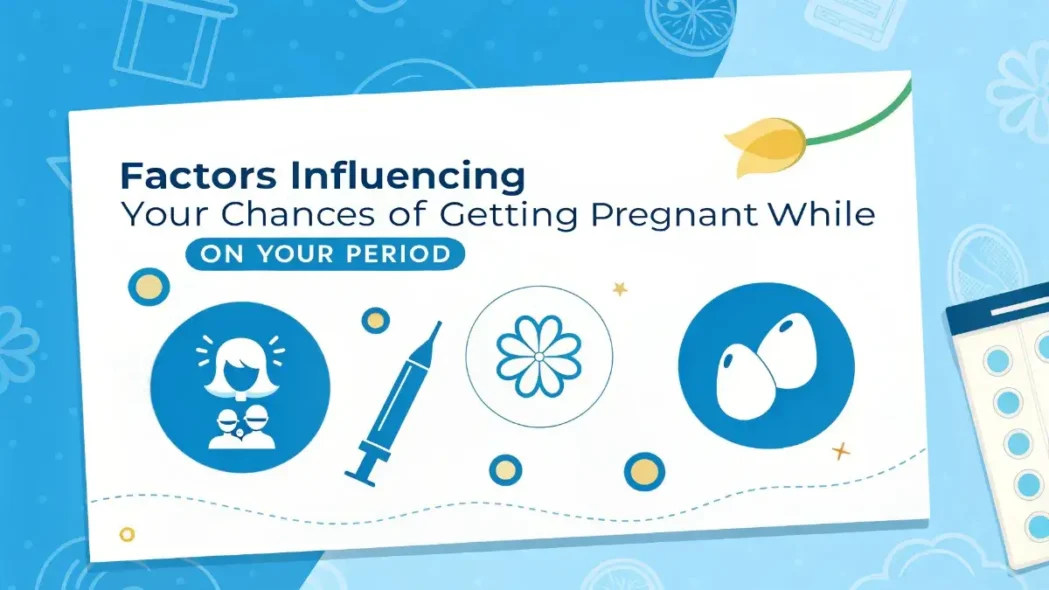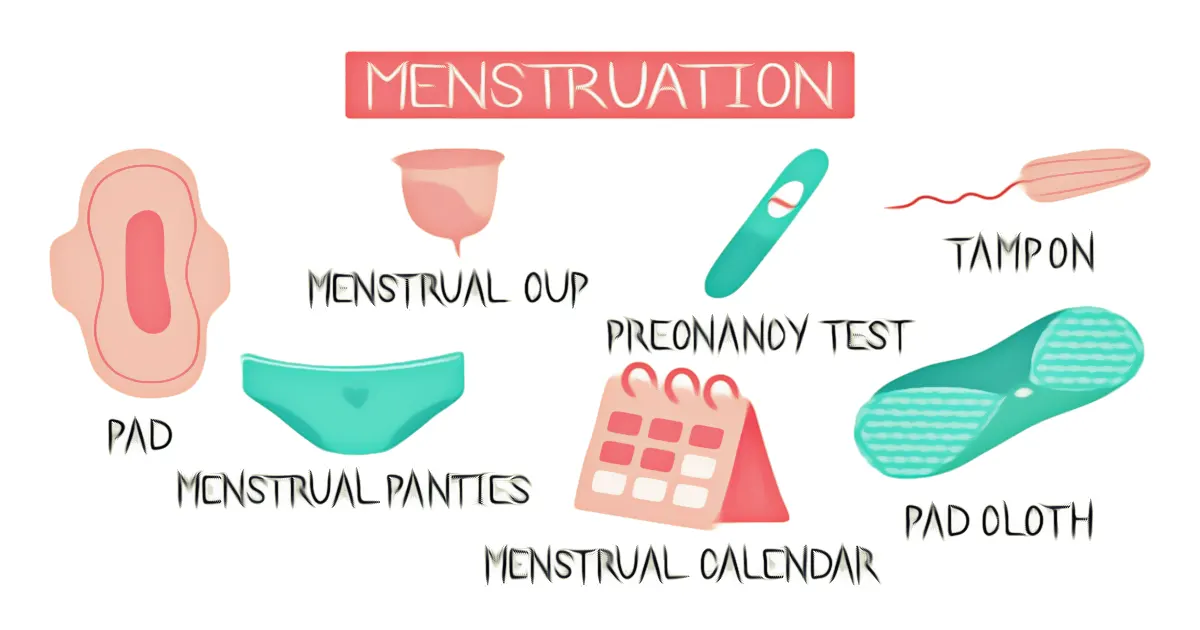When it comes to understanding your body and planning for pregnancy (or avoiding it!), there’s a lot of information out there. One question that often pops up is, “Can you get pregnant while on your period?” Many people believe it’s impossible, but the truth is a bit more complicated. While the chances of getting pregnant during your period are generally low, it’s not entirely impossible. This article will clear up the myths, explain how your body works, and help you understand the real chances of getting pregnant while on your period.
Key Takeaways
- Low, but Not Zero Risk: While the odds are low, it is possible to get pregnant if you have sex during your period.
- Sperm Survival Matters: Sperm can live inside your body for up to 5 days, meaning if you ovulate soon after your period ends, conception is possible.
- Cycle Length is Key: Women with shorter menstrual cycles (21-24 days) have a higher risk because ovulation can happen very close to, or even during, their period.
- Tracking Helps: Understanding your unique menstrual cycle and ovulation patterns is crucial for either trying to conceive or preventing pregnancy.
- Contraception is Best: If you want to avoid pregnancy, reliable birth control methods are the most effective way to prevent conception at any point in your cycle.
Understanding Your Menstrual Cycle and Ovulation: The Basics of Getting Pregnant
To truly grasp the chances of getting pregnant while on your period, we first need to understand the remarkable journey your body undergoes each month. This journey is called the menstrual cycle.
The Menstrual Cycle Journey
Your menstrual cycle is a series of changes that your body undergoes each month to prepare for a possible pregnancy. It starts on the first day of your period and ends the day before your next period begins. The typical cycle length is about 28 days, but it can be shorter (21 days) or longer (up to 35 days) and still be considered normal.
During your cycle, hormones like estrogen and progesterone work together to:
- Thicken the lining of your uterus: This prepares a soft, nourishing home for a fertilized egg.
- Release an egg: This process is known as ovulation.
- Shed the uterine lining: If pregnancy doesn’t happen, this lining is shed as your period.
Ovulation: When the Magic Happens
Ovulation is the most important event in your cycle when it comes to getting pregnant. It’s when a mature egg is released from one of your ovaries. This typically occurs around the middle of your menstrual cycle. For a typical 28-day cycle, ovulation might occur around Day 14. However, this timing can vary a lot!
Once released, the egg typically lives for only a short time, usually between 12 and 24 hours. For pregnancy to occur, a sperm must fertilize the egg within that small window.
Sperm Survival: A Key Player in Pregnancy Chances
Here’s where it gets interesting and why the chances of getting pregnant while on your period aren’t zero. While the egg has a short lifespan, sperm are much tougher! After sex, sperm can survive inside the female reproductive system for up to 3 to 5 days, and sometimes even longer in perfect conditions.
This means that if you have sex a few days before ovulation, the sperm can wait patiently in your fallopian tubes for the egg to arrive. If an egg is released during that time, boom – pregnancy can happen!
“The remarkable survival of sperm inside the female body is a primary reason why pregnancy can occur even when intercourse doesn’t perfectly align with ovulation.”
Can You Get Pregnant While On Your Period? The Surprising Truth!
So, back to the big question: Can you get pregnant while on your period? The short answer is yes, it’s possible, though less likely than at other times in your cycle. Here’s why:
Short Cycles and Early Ovulation: A Higher Risk
If you have a shorter menstrual cycle, such as 21 to 24 days, your ovulation may occur much earlier than the typical Day 14. In some cases, ovulation can occur just a few days after your period ends, or even while you’re still bleeding!
Imagine this:
- You have a 21-day cycle.
- Your period lasts 7 days.
- You have sex on Day 6 (still on your period).
- You ovulate on Day 10 (which is very early in a 21-day cycle, but possible).
- Since sperm can live for up to 5 days, the sperm from Day 6 could still be alive on Day 10 to fertilize the egg. Pregnancy!
Long Sperm Lifespan: Why Timing Matters Even More
Even if you have a “normal” 28-day cycle, the long survival time of sperm can still create a risk. If you have sex towards the very end of your period, and then you happen to ovulate a bit earlier than expected (say, on Day 10 or 11 instead of Day 14), those surviving sperm could lead to pregnancy.
Spotting vs. Period: A Crucial Difference
Sometimes, what you think is your period might actually be spotting. Spotting can happen for various reasons, including ovulation bleeding or implantation bleeding (an early sign of pregnancy). If you mistake spotting for your period and have unprotected sex, your chances of getting pregnant while on your period (or what you thought was your period) could be higher, especially if it’s ovulation-related spotting.
Factors Influencing Your Chances Of Getting Pregnant While On Your Period

Several factors come together to determine your unique chances of getting pregnant while on your period. It’s not just a simple “yes” or “no.”
Here’s a look at how different factors play a role:
| Factor | How It Affects Risk |
|---|---|
| Menstrual Cycle Length | Shorter cycles (21-24 days): Higher risk as ovulation occurs closer to or during your period. |
| Longer cycles (28-35 days): Lower risk, as ovulation is typically further away from your period. | |
| Period Length | Longer periods (6-7+ days): Increases the chance of having sex closer to your fertile window, especially with short cycles. |
| Sperm Survival Time | Longer sperm survival (up to 5 days): Increases the window for conception if sex occurs before ovulation. |
| Cycle Regularity | Younger women May have more irregular cycles and higher overall fertility, potentially increasing risk. |
| Age | Younger women may have more irregular cycles and higher overall fertility, potentially increasing risk. |
| Spotting vs. Period | Mistaking spotting for a period: Can lead to unprotected sex during a fertile time. |
Irregular Cycles: The Wild Card
If your menstrual cycles are irregular, meaning they vary significantly in length each month, it becomes much harder to predict when you will ovulate. This unpredictability means that your chances of getting pregnant while on your period (or at any time) can be harder to gauge, and you might accidentally have sex during an unexpectedly fertile window.
Tracking Your Menstrual Cycle: Boosting or Avoiding Pregnancy
Whether you’re trying to get pregnant or trying to avoid it, understanding your cycle is powerful. Tracking can help you pinpoint your fertile window and give you a clearer picture of your body’s rhythm.
Why Tracking is Smart
Tracking helps you:
- Predict Ovulation: Know when your egg is likely to be released.
- Identify Your Fertile Window: The days when you’re most likely to conceive.
- Understand Your Body: Learn about your unique menstrual cycle patterns, including the length of your period and menstrual cycle.
- Plan Accordingly: Make informed decisions about when to have sex if you’re trying for a baby or when to use extra caution if you’re not.
Popular Tracking Methods:
There are several ways to track your cycle, from simple to high-tech:
- Calendar Method
- How it works: Mark the first day of your period on a calendar or in a notebook. After a few months, you can see how long your cycles typically are.
- Pros: Easy, free.
- Cons: Less accurate for predicting ovulation, especially if your cycles are irregular. It mainly helps you see patterns over time.
- Tip: This method is best for estimating your next period, not pinpointing ovulation precisely.
- Basal Body Temperature (BBT) Method
- How it works: You take your temperature every morning at the same time, before even getting out of bed, using a special thermometer. Your BBT usually rises slightly (about 0.5 to 1.0 degrees Fahrenheit) after you ovulate.
- Pros: Can confirm that ovulation has happened.
- Cons: Only tells you after ovulation, so it’s better for understanding past cycles than predicting future ones in real-time. Many factors can affect BBT (sickness, poor sleep).
- Cervical Mucus Method (CMM)
- How it works: You observe changes in your cervical mucus (vaginal discharge) throughout your cycle. As you get closer to ovulation, your mucus often becomes clear, slippery, and stretchy, like raw egg whites. This “egg white” mucus is a sign that you are highly fertile.
- Pros: Can help you identify your fertile window before ovulation.
- Cons: Requires careful daily observation and practice to interpret. It can be affected by medications or infections.
- Ovulation Predictor Kits (OPKs)
- How it works: These home urine tests detect a surge in Luteinizing Hormone (LH), which happens about 24-36 hours before ovulation.
- Pros: Highly accurate for predicting ovulation in advance.
- Cons: Can be more expensive than other methods. Doesn’t work for everyone (e.g., women with PCOS might get false positives).
- Apps & Technology
- Many apps (like Flo, Clue, and Ovia) combine these methods, allowing you to log your period dates, BBT, cervical mucus, and OPK results. Some even use algorithms to predict your fertile window.
- Pros: Convenient, as it helps visualize your cycle data.
- Cons: Still relies on accurate input from you; predictions are estimates.
For more information on understanding your body’s signals, you might find articles on very early signs of pregnancy helpful if you’re trying to conceive.
Timing Intercourse for Conception: Maximizing Your Chances (or Avoiding Them)
If you’re trying to get pregnant, timing is everything! If you’re trying to avoid it, knowing these times is equally important.
Your Fertile Window: The Best Time to Try
Your “fertile window” is the period when you have the highest chance of conceiving. This window includes the 5 days leading up to ovulation and the day of ovulation itself. Why 5 days? Because of sperm survival!
To maximize your chances of getting pregnant, aim to have sex every 1-2 days during your fertile window. This ensures there’s always a fresh supply of sperm waiting when the egg is released.
What If You’re Trying to Avoid Pregnancy?
If avoiding pregnancy is your goal, then understanding your fertile window means knowing when to either abstain from sex or use a reliable form of birth control. Relying on your period as a “safe time” is risky because of the factors we’ve discussed (short cycles, extended sperm survival, irregular ovulation).
Birth Control: Your Best Defense Against Unwanted Pregnancy
For those who want to avoid pregnancy, relying on the chances of getting pregnant while on your period being low is not a reliable strategy. Effective birth control methods are the safest and most responsible way to prevent unwanted pregnancies.
There are many types of birth control, each working differently:
- Hormonal Methods: These use hormones (estrogen and/or progestin) to prevent ovulation, thicken cervical mucus (making it hard for sperm to pass), or thin the uterine lining.
- Examples: Birth control pills, patches, vaginal rings, injections (Depo-Provera), hormonal IUDs (Mirena, Kyleena), and implants (Nexplanon).
- Effectiveness: Very high when used correctly.
- Barrier Methods: These create a physical barrier to stop sperm from reaching the egg.
- Examples: Condoms (male and female), diaphragms, cervical caps, and contraceptive sponges.
- Effectiveness: Varies; condoms are highly effective against STIs, too, but user error can reduce pregnancy prevention.
- Long-Acting Reversible Contraceptives (LARCs): These are highly effective and last for several years, requiring little to no daily effort.
- Examples: IUDs (hormonal and non-hormonal copper IUDs) and implants.
- Effectiveness: Over 99% effective.
- Permanent Methods: For those who are sure they don’t want future pregnancies.
- Examples: Tubal ligation (for women) and vasectomy (for men).
It’s really important to talk to a healthcare professional about your lifestyle, health, and family planning goals to find the best birth control method for you. They can help you weigh the pros and cons of each option.
Common Myths About Getting Pregnant On Your Period (and Why They’re Wrong)
The idea that you absolutely cannot get pregnant during your period is a widespread myth. Let’s bust some common misconceptions:
- Myth 1: “You can’t get pregnant on your period.”
- Reality: As we’ve seen, while the risk is lower, it’s definitely possible, especially with shorter cycles or extended sperm survival.
- Myth 2: “Sex during your period is ‘safe’ birth control.”
- Reality: No, it’s not. Relying on this belief can lead to an unintended pregnancy. It’s not a reliable form of contraception.
- Myth 3: “All women have a 28-day cycle and ovulate on day 14.”
- Reality: While 28 days is an average, cycle lengths vary significantly from person to person (21-35 days is standard). Ovulation timing also varies, making it impossible to assume a universal “safe” window.
When to Seek Professional Advice About Your Fertility Journey
Understanding your cycle and the chances of getting pregnant while on your period is a great first step, but sometimes you need expert guidance. Knowing when to talk to a doctor or fertility specialist is crucial.
Signs to Look Out For:
- Irregular Menstrual Cycles: If your periods are very unpredictable, very short (less than 21 days), or very long (more than 35 days), it could signal an underlying issue with ovulation or hormones.
- Unsuccessful Conception After a Year: If you’re under 35 and have been actively trying to conceive for 12 months (or 6 months if you’re over 35) without success, it’s a good time to consult a doctor.
- Known Health Conditions Affecting Fertility: Conditions like Polycystic Ovary Syndrome (PCOS), endometriosis, thyroid disorders, or a history of STIs can impact fertility. Discussing these with your doctor is essential.
- Concerns about Symptoms: If you’re experiencing unusual symptoms during your cycle, like severe low belly pain in the first trimester of pregnancy (if pregnant) or persistent pain, always seek medical advice.
- Planning Pregnancy: Even if you don’t have concerns, a preconception check-up can ensure you’re in the best health for pregnancy.
Fertility Testing & Support:
A healthcare professional can offer:
- Personalized advice: Tailored to your specific health history and menstrual cycle.
- Fertility testing: For both partners, if needed, to identify any issues.
- Treatment options: If fertility challenges are identified.
- Contraception counseling: To help you choose the best method if you’re not planning a pregnancy.
Remember, your health journey is unique. Don’t hesitate to reach out to a professional for personalized guidance and support.
FAQs
What are the odds of getting pregnant on your period?
The odds are relatively low but not zero. They increase if you have a short menstrual cycle (21-24 days) or if you have sex towards the end of a more extended period, due to sperm survival for up to 5 days and potential early ovulation.
When is the safest day not to get pregnant?
There’s no truly “safest” day without contraception. However, the days just before your period starts and the first few days of your period are generally considered less fertile than other times. But due to sperm survival and variable cycle lengths, even these days carry a small risk. The only truly “safe” way to avoid pregnancy is consistent and correct use of effective birth control.
Can I get pregnant after 2 days of my period?
Yes, it is possible, especially if you have a short menstrual cycle. If your cycle is, for example, 21-24 days long, you could ovulate as early as 7-10 days after your period starts. Since sperm can live for up to 5 days, sex on day 2 of your period could result in sperm being present when an early ovulation occurs.
When are you least fertile?
You are generally least fertile during your period (especially the first few days) and in the days immediately following your period, before your fertile window begins. However, as discussed, even these times are not 100% risk-free due to the variability of cycle lengths and sperm lifespan.
Conclusion
The idea that you can’t get pregnant while on your period is a common misconception. While the chances of getting pregnant while on your period are lower compared to your most fertile days, it’s definitely not impossible. Factors like shorter menstrual cycles, the long survival time of sperm, and irregular ovulation can all increase your risk.
Understanding your unique menstrual cycle is key, whether you’re trying to conceive or prevent pregnancy. Tracking your cycle using methods like calendars, BBT, or OPKs can give you valuable insights. However, if avoiding pregnancy is your goal, relying on your period as a “safe” time is risky. The most effective way to prevent unintended pregnancy is to use reliable contraception consistently and correctly.
Every person’s body is different, and fertility can vary. If you have any concerns about your fertility, your menstrual cycle, or need advice on contraception, always consult with a healthcare professional. They can provide personalized guidance and support to help you make informed decisions about your reproductive health.
The information provided in this article is for educational purposes only and should not be considered as medical advice. Always consult with a healthcare professional for personalized guidance and care.


